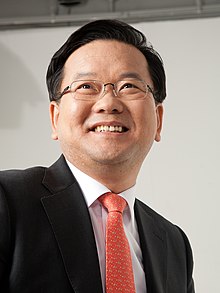
Back কিম বু-কিয়াম Bengali/Bangla Kim Pu-gjom Czech Kim Boo-kyum German Kim Boo-kyum Spanish کیم بو-کیوم Persian Kim Boo-kyum Finnish Kim Boo-kyum French Kim Bugjom Hungarian Kim Boo-kyum ID Kim Boo-kyum Italian
Kim Boo-kyum | |
|---|---|
김부겸 | |
 Kim in 2017 | |
| Prime Minister of South Korea | |
| In office 14 May 2021 – 11 May 2022 | |
| President | Moon Jae-in |
| Deputy | Yoo Eun-hae Hong Nam-ki |
| Preceded by | Chung Sye-kyun Hong Nam-ki (acting) |
| Succeeded by | Choo Kyung-ho (acting) Han Duck-soo |
| Minister of the Interior and Safety | |
| In office 16 June 2017 – 6 April 2019 | |
| Prime Minister | Lee Nak-yeon |
| Preceded by | Hong Yoon-shik |
| Succeeded by | Chin Young |
| Member of the National Assembly | |
| In office 30 May 2000 – 29 May 2012 | |
| Preceded by | Lew Seon-ho |
| Succeeded by | Lee Hack-young |
| Constituency | Gunpo |
| In office 30 May 2016 – 29 May 2020 | |
| Preceded by | Lee Hahn-koo |
| Succeeded by | Joo Ho-young |
| Constituency | Suseong A (Daegu) |
| Personal details | |
| Born | 21 January 1958 Sangju, South Korea |
| Political party | Democratic |
| Other political affiliations | HDP (1988–1991) Democratic (1991–1995) UDP (1995–1997) GNP (1997–2003) Independent (2003; 2007) Uri (2003–2007) GUDNP (2007–2008) UDP (2008) Democratic (2008–2011) DUP (2011–2013) Democratic (2013–2014) NPAD (2014–2015) |
| Alma mater | Seoul National University (BA) Yonsei University (MPA) |
| Occupation | Activist, politician |
| Signature |  |
| Korean name | |
| Hangul | 김부겸 |
| Hanja | 金富謙 |
| Revised Romanization | Gim Bugyeom |
| McCune–Reischauer | Kim Pugyŏm |
Kim Boo-kyum (Korean: 김부겸; Hanja: 金富謙; RR: Gim Bugyeom; born 21 January 1958) is a South Korean activist and politician, who served as the prime minister of South Korea from 2021 to 2022. He was the former Minister of Interior and Safety from 2017 to 2019. A member of the Democratic Party, he also served as the Member of the National Assembly for Suseong 1st constituency from 2016 to 2020 and was previously MP for Gunpo from 2000 to 2012, first for the Grand National Party (GNP) and then, from 2003,[1] the liberal Uri Party and its successors. In the 2016 parliamentary election in Daegu, Kim defeated his Saenuri opponent Kim Moon-soo in a 62.5 per cent landslide, marking the first time a member of a liberal party had been elected in that city since 1985.[2] Kim had earlier stood for mayor of Daegu in the 2014 local elections, and received 40 per cent of the vote, a number seen at the time as unusually large in the conservative stronghold. He stated in 2014 that he hoped to "overcome the barrier of regionalism".[3]
- ^ "Movement for Reformative Party Starts". The Chosun Ilbo. 7 July 2003. Retrieved 17 April 2016.
- ^ "Kim Boo-kyum Receives a Magical 62.5% of Votes, "The Citizens of Daegu Have Rewritten History"". The Kyunghyang Shinmun. 14 April 2016. Retrieved 17 April 2016.
- ^ "After Daegu election loss, NPAD's Kim looks to 2016". Korea JoongAng Daily. 11 June 2014. Retrieved 17 April 2016.